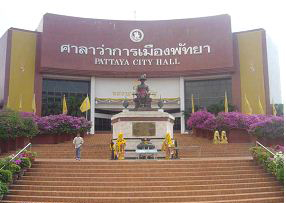Land and Building Tax in Pattaya “The long arm of taxation”
- Posted in Readingroom
- Write comment
Nobody can deny that everything is impermanent except “death” and “taxation”. The long arm tax policy of the HMRC causes misery for many British tax payers who are forced to give up their possession in the UK and buy property in Pattaya.
Many of them set up a Thai company to own the property. The circle of life in every year for these foreign property buyers is to see their lawyer and accountant to prepare and submit their company’s balance sheet and tax returns. This company ownership structure is always a good solution to be free from all hungry vultures. These foreigners believe in the old say that “Hell hath no fury more than a woman scorned” and are scared to put the ownership of their property and destiny in the name of their Thai lady.
After three years of incorporation, these foreign property buyers may pay some company taxes to the Revenue Department for 2/3 thousand baht. It is not the end of the world to pay some taxes. However, some unfortunate foreigners pay some other taxes from the technical mistakes of their unqualified consultant. We came across some gullible foreign property buyers pay all taxes for the developer.
2010 is the year for tax collectors work harder to make the incomes for the government who spend more money for the popularist policy. The central government by the Revenue Department will collect the direct taxes from all incomes and consumption taxes from the Value Added Tax (VAT) and many excise and stamp duties.
How about the local taxes? They are collected by the local administrative, e.g., the Pattaya City Hall or Local Administrative Office (Or.Bor.Tor).
The tax policy implemented by the Pattaya City Hall and all Or.Bor.Tor Offices is to inspect the land and building tax. If you have the empty plot of land, you can still remain carefree because the local development tax for the empty plot of land is quite low. In this article, we will talk only about the land with the building on the land. Of course, we always focus on foreign owners.
What is the building tax?
Under the Building and Land Taxes Act 1932 (with the 4th amendment in 1991) may collect the taxes from the land and building, e.g., residential houses, shop houses, commercial buildings, office buildings, apartments or condominium. The tax rate is 12.5% per year from the gross incomes generated from the use of the building for the commercial purpose or rent out to a third party.
If there is no income from the land and building, the land and building tax will not be imposed. For example, the owner who lives in his house without any commercial activities will not pay the land and building tax. The question who is the owner of the building must be verified in the House Register Book (Tabien Baan). In Thailand, nobody can have his/her name recorded as the owner in more than one house.
The empty house will not be subject to the land and building tax. Under Section 9.- of the Land and Building Tax Act 1932, the empty building without commercial activities or not being used as a storage of goods will be exempted from these land and building taxes.
How about a foreigner who lives in the house owned by his Thai company?
In theory, the land and house belong to the company not its foreign director. The Revenue Department always assumes that the director who lives in the house owned by the company must pay rents to the company. However, after calculation of deductible expenses and depreciation, most of companies still pay no tax from the rental incomes. For calculation of tax, the reasonable rental rate will be assessed from the market value of the property which is not really draconian.
The land and building tax can be based on the annual gross rental incomes with the same assessment method. The flat rate of 12.5% from the gross annual incomes will be collected without any deductible expenses. It is the subjective question to assess the reasonable rental rate.
Who will pay the land and building tax?
The owner of the land and building will have to pay this local tax. If the land and building is owned by a Thai company, its director will have to file the tax returns and definitely make payment on behalf of the company.
Some foreign property buyers are advised to put their names in a building permit not their company to prove that they are the owner of the house. However, the land still belongs to the company which will be subject to the tax from the rental incomes. Please be prudent to clarify this complicated matter with your licensed lawyer of Tanai Kwam otherwise you may be involved in the tax evasion.
Some foreigners put the ownership of the property in the name of their Thai lady in stead of Thai company. If they register a 30-year lease with the Land Office, the land and building tax will be imposed once their Thai wife deal with the Pattaya City Hall or Or.Bor.Tor about the house register book (tabien baan). Now the Land Office and the local administrative offices have not yet worked together to follow this local tax.
The land and building tax must be paid within February of the following year whereby the owner of the land and building will have to file the tax returns form (Phor.Ror.Dor 2).
The Pattaya tax collectors are randomly inspecting all building to make the tax assessment (Phor.Ror.Dor.8). Within 30 days after receiving the assessment form (Phor.Ror.Dor.8), the owner will have to pay the tax mentioned in the assessment form. If the owners still ignore to pay the land and building tax even after the assessment has been served, the Pattaya City Hall or Or.Bor.Tor. may issue a warrant to seize the assets of the defaulting owner even without the judicial injunction.
The late payment will be subject to the surcharges of 2.5% for the first month and 5% for the second month and 7.5% for the third month and the maximum of 10% after the forth month.
The appeal against the assessment (Phor.Ror.Dor.8) can be filed with the Pattaya City Hall or Or.Bor.Tor. Local Administrative Office within 15 days after the tax assessment form (Phor.Ror.Dor.8) has been served.
If you are not satisfied with the answer of your appeal, you may seek for the light of justice with the Court. Please search for more information about Thai laws in www.thaisolicitor.com share your comments with lawyer Ponthep Werachon e-mail: [email protected] or 081 4234255.
“The value of justice will always cost you time, money and morale”

